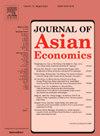The Belt and Road Initiative and China's diversifying food imports: A perspective on the "Five-pronged approach"
IF 2.9
3区 经济学
Q1 ECONOMICS
引用次数: 0
Abstract
The diversification of imported food varieties is essential for ensuring China's food security. Since the inception of the Belt and Road Initiative (BRI), there has been a significant increase in agricultural trade cooperation between China and participating countries, facilitated by the "Five-pronged approach" (FPA). However, existing research regarding the BRI's impact on imports has not yet fully addressed the complexities inherent in agricultural trade, such as stringent logistics, customs regulations, inspection and quarantine procedures, and the varying trade costs associated with different agricultural commodities. This underscores a research gap in understanding the BRI's effectiveness in promoting diversified food imports, particularly across distinct food categories. Utilizing the Difference-in-Differences model, this research evaluates the BRI's contribution to China's diversified food imports and the heterogeneity of food types. The empirical findings suggest the initiative significantly promotes diversification in China's food imports, notably in the case of vegetable products, while the expansion of animal product imports continues to require sustained support from the FPA. The mechanism analysis indicates the FPA effectively reduces both direct and implicit trade costs, thereby fostering the growth of diversified food imports in China. Additionally, this study examines the initiative's effect on food and nutrition security among participating countries, highlighting a marked promotion of diversified food imports and dietary diversity. This research reinforces the BRI's pivotal role in advancing food security, both within China and across the participating nations.
“一带一路”倡议与中国食品进口多元化:基于“五位一体”的视角
进口食品品种多样化对保障中国粮食安全至关重要。自“一带一路”倡议提出以来,在“五位一体”的推动下,中国与沿线国家的农产品贸易合作显著增加。然而,关于“一带一路”对进口影响的现有研究尚未完全解决农业贸易固有的复杂性,例如严格的物流、海关法规、检验检疫程序以及不同农产品相关的不同贸易成本。这表明,在理解“一带一路”倡议在促进食品进口多样化,特别是跨不同食品类别进口方面的有效性方面,存在研究缺口。利用差异中的差异模型,本研究评估了“一带一路”倡议对中国食品进口多样化和食品类型异质性的贡献。实证结果表明,该倡议显著促进了中国食品进口的多样化,尤其是蔬菜产品,而动物产品进口的扩大仍然需要FPA的持续支持。机制分析表明,FPA有效降低了直接和隐性贸易成本,从而促进了中国多样化食品进口的增长。此外,本研究还考察了该倡议对参与国粮食和营养安全的影响,强调了该倡议对粮食进口多样化和饮食多样性的显著促进。这项研究强化了“一带一路”倡议在促进中国国内和参与国粮食安全方面的关键作用。
本文章由计算机程序翻译,如有差异,请以英文原文为准。
求助全文
约1分钟内获得全文
求助全文
来源期刊

Journal of Asian Economics
ECONOMICS-
CiteScore
4.70
自引率
9.40%
发文量
90
期刊介绍:
The Journal of Asian Economics provides a forum for publication of increasingly growing research in Asian economic studies and a unique forum for continental Asian economic studies with focus on (i) special studies in adaptive innovation paradigms in Asian economic regimes, (ii) studies relative to unique dimensions of Asian economic development paradigm, as they are investigated by researchers, (iii) comparative studies of development paradigms in other developing continents, Latin America and Africa, (iv) the emerging new pattern of comparative advantages between Asian countries and the United States and North America.
 求助内容:
求助内容: 应助结果提醒方式:
应助结果提醒方式:


